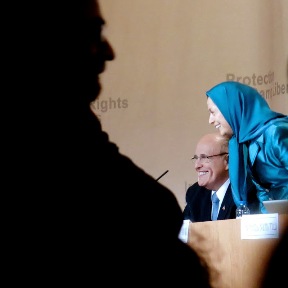On Saturday, 7 December 2013, in an auditorium at the Bourse in Paris, France, Maryam Rajavi and the Mujahadeen-e-Khalq (MEK) held a meeting with several notable supporters including former New York
 |
| Photo by CSD of Rudolph Giuliani and Maryam Rajavi |
Mayor and Republican Presidential Candidate Rudy Giuliani, former Vermont Governor and Democratic Presidential Candidate Howard Dean, former attorney general in the George W. Bush administration Michael Mucasey, and South African Archbishop Desmond Tutu’s daughter Naomi Nontombi Tutu. Over the years, despite it cult-like practices and even when it was formally labeled a terrorist organization, the organization managed to acquire quite a list of high-profile ex-dignitaries in the United States.
I went to cover the event because I think the group may wind up playing a role of one sort and another helping to undermine American and European efforts to reach an agreement with Iran to forestall and foreclose its nuclear weapons capability.
There are several ways the MEK might do this.
It was listed by the U.S. State Department as a terrorist organization until last year for reasons outlined in this Council on Foreign Relations Backgrounder. Despite official denials, it may yet try to use violence inside Iran to undermine the talks, knowing full well that any terrorist incidents will serve the hardliners in the regime and “exacerbate the contradictions,” as leftist revolutionaries used to say. When Iranian scientists have been killed, suspicion often has fallen on the MEK, the Israelis, or both.
The MEK claims to have extensive intelligence resources on the ground in Iran and claims credit for the important revelation in 2002 of the regime’s secret nuclear program, although there has been extensive speculation that the actual intelligence was supplied to the MEK by the Israelis. Its ability to float information — or disinformation — about the regime’s activities could complicate debate inside the United States.
To the extent the MEK claims credit for adding to the pressure on the Iranian government to negotiate it strengthens the hand of those inside Iran who want to discredit the negotiators.
But its greatest disruptive ability at the moment may well be connected to the way the Iranian-backed government of Iraq has treated MEK members in various camps there. On September 1 this year, 52 of them were killed, allegedly by special forces from the Iraqi Ministry of Interior, and seven (six of them women) are alleged to have been taken hostage.
Why the Iraqi government would do this, even with prodding from the Iranians, is something of a mystery. One obvious possibility would be revenge: the MEK sided with the mullahs to overthrow the shah, then attempted, and failed, to take over the revolution; it subsequently blew up scores of top Iranian religious leaders, and after Saddam Hussein invaded Iran it sided with his forces. More than 20 years later, when the United States led the invasion of Iraq to overthrow Saddam, the MEK still supported him. But U.S. forces decided its members might be used in some way as a card in future negotiations with Iran and the more than 3,000 MEK members in Iraq were put in a camp, disarmed, and began an existence in legal, political and diplomatic limbo. As the United States withdrew from Iraq in 2011, fears mounted that the government of Prime Minister Maliki would simply ship the Iranian MEK members across the border to face the tender mercies of the government in Tehran.
That did not happen. Instead their camp at Ashraf was closed after a violent incursion by Iraqi forces and they were sent to Camp Liberty on the outskirts of Baghdad (although they are still referred to by the MEK as “Ashrafis,” which is why in my tweets there were some references to killings at Camp Ashraf that were in fact at Camp Liberty).
The United States and the United Nations High Commissioner for Refugees assured the Ashrafis that they would be resettled in other countries, but that process has been very slow and one of the few countries willing to accept them even temporarily for medical care has been Albania. The camp came under repeated mortar attacks, and then came the September 1 killings and abductions.
Giuliani, Dean and others who worked to get the MEK “delisted” from the State Department’s catalogue of foreign terrorist organizations were involved to some extent in the assurances given the MEK that they would be protected at Camp Liberty and relocated in a timely fashion.
Giuliani argued yesterday that the issue of the Ashrafis and the nuclear negotiations should be linked, something the Obama administration is very unlikely to do. Dean claimed that failure to protect the Ashrafis dishonored the United States of America.
Following are my live tweets from the meeting:
http://christopherdickey.blogspot.co.uk/2013/12/the-mujahadeen-e-khalq-mek-and.html?spref=fb
Award-winning author Christopher Dickey is the Paris Bureau Chief and Middle East Regional Editor for The Daily Beast. Chris’s nonfiction books include “Securing the City,” a New York Times Book Review notable book in 2009; “Summer of Deliverance,” his memoir about his father, poet and novelist James Dickey; “Expats,” about Westerners in the modern Arab and Muslim world; and “With the Contras,” a first-hand account of combat in Central American wars. He is also the author of two acclaimed thrillers: “Innocent Blood” and “The Sleeper.” Before moving to Newsweek, Chris worked for The Washington Post as Cairo Bureau Chief and Mexico City Bureau Chief. Chris’s columns about counter-terrorism, espionage and the Middle East appear on The Daily Beast. Links to most recent columns and articles are posted on The Shadowland Journal, and also on the archive at ChristopherDickey.com.
Christopher Dickey, The Shadowland Journal

